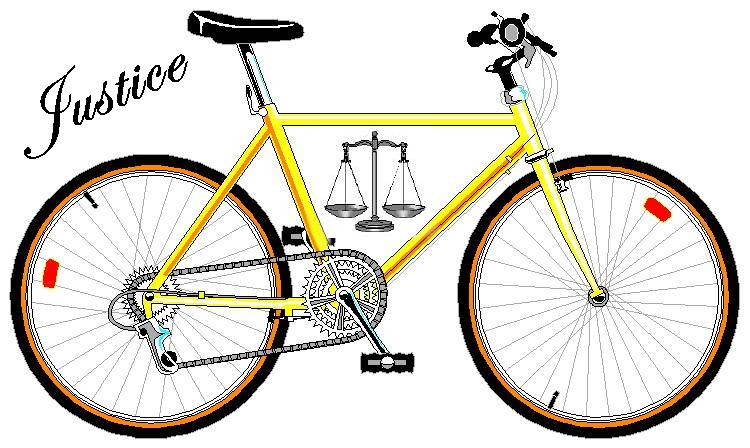The phrase “motor vehicle homicide by a negligent driver” is rarely uttered in the same sentence as “for a cyclist’s death.” Atypically, a recent headline reflecting such an incident read: “Wellesley doctor killed in bicycle accident, driver charged.”
This case was an exception to the rule. And a clue as to why can be found in the headline. It’s the word “doctor.” But not just any doctor, a prominent and well-respected doctor.
“Stanley Sabin, 74, was the retired chief of medicine and director of pulmonary medicine at MetroWest Medical Center. In retirement he was a volunteer Medical Director of the MetroWest Free Medical Program which provides care to uninsured and underinsured patients.”
I was saddened to hear of this local doctor’s death. He was struck and killed by a negligent motorist while out on a midday ride. It was tragic.
Any unnecessary death of a cyclist should be tragic – but according to our car-centric society, it’s not. Scores of cyclists are killed by motor vehicles every year without penalty to the drivers. Only when a high profile person suffers this fate does anyone seem to care.
In this instance, little detail was provided about the circumstances of the incident. At 1:07 p.m., the doctor was traveling north on Route 115 in Millis when he was hit by a Nissan Sentra driven by a 62-year-old woman. The driver will be charged with one count of motor vehicle homicide by negligent operation.
Rather than telling us how the cyclist got hit, the article talks about the doctor’s career and why he will be missed. Friends and acquaintances are quoted, always saying kind things about the cyclist and what a loss his death represents to everyone around him. Despite the crash being under investigation at the time the article was written, the author could have relayed some specifics about the interaction between car and bicycle.
I could only imagine, when reading the article, that the reason this cyclist’s death was reported – and the motorist charged with vehicular homicide – was that he was of value to society in a traditional sense of the word. His work helped many people. Ironically, this cyclist saved lives for a living and his own life was taken by someone who didn’t give the well-being of strangers a second thought.
While I’m glad to see a motorist getting charged for a change, it’s discouraging to see so little emphasis on the cyclist’s perspective. The operator of the motor vehicle was driving negligently when she hit the cyclist. Cyclists witness such behavior all the time. Yet, there’s no mention of how frequently drivers fail to follow proper safety precautions to avoid injury or death to cyclists. Not only would mentioning it vindicate the cyclist who needlessly lost his life, but it would also serve to educate the public about how easily their carelessness can end another human being’s life.
Had this cyclist been an average man on the street, the driver probably would have been forgiven. Nine times out of ten, police side with a motorist against a cyclist. In this case, the fact that the cyclist was a prominent doctor, who cared for the poor, made him appear more “responsible” than other – unknown – cyclists.
The standard question regarding a cyclist’s sense of personal safety was asked in the article: “was the cyclist wearing a helmet?” Yes, he was – but he suffered severe head injuries anyway. Nonetheless, the presence of a helmet worked in his favor. Without one, he would have looked irresponsible. The appearance of responsibility provides yet another argument in favor of wearing a helmet. It goes a long way with police and the media.
Typically, cyclists are assumed to be reckless. Or, their skill and judgment is questioned. Conversely, no amount of irresponsible driving on the part of motorists – who, in Massachusetts, are particularly notorious for their wild antics – seems to factor into how police perceive bicycles versus cars.
Cyclists should demand less cookie-cutter reporting. Just the title of the article “Wellesley doctor killed in bicycle accident” minimizes the incident by using the term “accident” rather than “homicide.” The bottom line is: the driver was charged with vehicular homicide by negligent operation. It wasn’t an accident.
This cyclist’s death was a loss not only to his family and friends, but also to the cycling community because he was the antithesis of the stereotypical cyclist. He was a responsible, upstanding member of society. He represented many of us who, while less accomplished than he, value the same ideals he stood for: we ride our bikes out of sheer joy, for preservation of the environment, and for the promotion of good health.
To reduce the number of needless cycling fatalities, more emphasis must be placed on reporting the particulars of crashes involving cars and bicycles. Public awareness must be raised about how negligent driving kills cyclists.
May Dr. Sabin rest in peace with the knowledge that the cycling community, through activism and education, will not let his life be lost in vain.




3 Responses to Motor Vehicle Homicide Only Applies When a Cyclist is Prominent